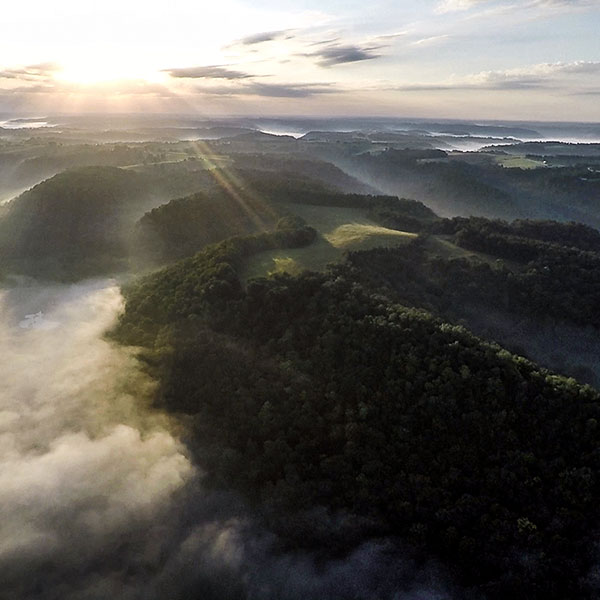[00:00:00] Speaker A: Welcome to another episode of Soundscapes, a terrain.org podcast. In this episode, we're lucky to listen in on a wide ranging and of course, it is rasque, delightful conversation between Roske and terrain Org's poetry editor, Derek Sheffield. Again and again you'll hear rasque jump from joy to a penetrating assessment of the many challenges we're facing, both individual, individually and collectively, all before letting loose a deep belly laugh. Though gay himself is quick to point out that he's not interested in understanding, he is interested in being in awe of, curious about, and there is truly an awful lot of hard won and graciously given wisdom in this conversation.
We'll start off, though, with a poem by Karen Miriam Goldberg at the first.
[00:00:51] Speaker B: Scent of daylight by Karen Miriam Goldberg it's never what you think when you step into the afternoon sky, the indoor world behind you, asleep in the sleeping bed, cats and all. It's not the cold wood smell of dusk, a little coal, a little pine, or the smell of high noon clothes evaporating rainwater on or off the line. It's not the middle of the dark when you were eight, screeching breaks a block away, escaping a dream that smells like wet leaves and grapefruit. No, it's more like a spray of sea without the salt water. A relief, the flight of grasshoppers, the mechanics of daylight opening the wings in everything. Even you.
[00:01:49] Speaker A: Now for our conversation with Roske, hosted by Derek Sheffield, who, you'll hear begin the conversation.
[00:01:58] Speaker C: One of the things that occurred to.
[00:02:00] Speaker D: Me as I was reading this passage.
[00:02:04] Speaker C: In the book of more delights is the passage is, and I noted how pleased I was delighted, even as I tend often to be, at having not reached the summit, to have gotten close but no cigar and so forth. And it put me in mind of.
[00:02:21] Speaker D: Something that I think Richard Hugo said.
[00:02:26] Speaker C: That I think you know what it is. I think that poets, we're in love with our own responses to things.
[00:02:37] Speaker E: That is a lovely way to put it.
I like his poems a lot. Richard Hugo. I have never thought of it like that, but I think that's a pretty good way to put it.
[00:02:48] Speaker F: It's so funny.
[00:02:50] Speaker E: I often think that things remain interesting to me as things to write about or wonder about when I don't understand them, when I don't know them. But there's some relationship to that, loving the response to the puzzlement or the I can't quite parse it out. It's such a good question.
[00:03:08] Speaker F: There's some relationship that makes me think that we might be in love with.
[00:03:15] Speaker E: Our capacity for, like, flabbergastment or our capacity for being moved, which is also to say, whether or not we think of it often, is that we're in love with our capacity to not know. Because I think knowing knowledge is a way of sort of knowledge makes one stable.
[00:03:30] Speaker F: But to be unknown, unknowing, even oneself.
[00:03:34] Speaker E: Unknown to oneself, that means you're capable of being changed, actually.
[00:03:40] Speaker F: I love that you said that.
[00:03:42] Speaker C: As you dig into it, I think that's right. I think it feels to me that.
[00:03:47] Speaker D: What'S behind that is the curiosity and.
[00:03:54] Speaker C: That we're saying, well, why do I feel this way? What and why? And as you say, the not knowing. Speaking of the not knowing, since you led us there, you write the moon may have chosen a few of the words in that last sentence. I am all the way on that team and have been for a little while now, even though I was quite slow getting there. Committed, atheist, dico, materialist. I aspired to be pretending or hoping everything was a machine that could be parsed and tinkered and decoded and conquered and possessed by the human intellect. Figured out, I guess, myself especially. I wonder. No luck. What is that about? I mean, my God.
[00:04:40] Speaker D: And I stop there.
[00:04:41] Speaker C: So you're no longer a materialist? Are you a spiritualist then, Roske?
[00:04:47] Speaker F: Tell us.
[00:04:48] Speaker E: Well, I think I'm no longer on team. It's all a machine.
I'm really convinced that there is more understanding than we will ever understand. There's more understanding, and I'm not interested in understanding at all.
Again, I'm sort of interested in describing. I'm interested in being lost with or in the presence of, or curious about, but I'm not actually interested in getting to the end or the bottom of it. And I'm sure as hell not interested.
[00:05:18] Speaker F: In trying to outsmart it. There's a kind of market for outsmarting the earth, actually.
[00:05:24] Speaker E: The end result of which is that you destroy the earth if you keep.
[00:05:28] Speaker C: Going down that cartesian worldview.
[00:05:31] Speaker D: That's interesting.
[00:05:32] Speaker C: So have you chosen a flavor? Jesus, Buddha, Bhagavad Gita?
Or is it a neapolitan?
[00:05:46] Speaker E: It's kind of like the mountain mint and the bees.
That's sort of like what it is.
It's funny, I was actually just this morning, I was, like, looking at the mint here in front of our place is just nuts with bees right now. And I was actually trying consciously to identify what the feeling of really looking at that orgy is. And I was like, oh. The feeling is like I don't know shit. In addition to, like, man, there's so much something being satisfied here. There's so much interaction and collaboration that then when I realize every single time I look, there's eleven things that I didn't see the last time, I'm like.
[00:06:28] Speaker F: God damn, I just don't know shit.
[00:06:32] Speaker D: Yeah, I have some footage of.
[00:06:36] Speaker C: I just took my daughter on a hike nearby here this past weekend, and I couldn't help but they call me the paparazzi because I was a late holdout. I resisted this for a long time, but then when I finally did get it, I realized I always had this camera on me. And, I mean, it was about the daughters, but then it's also about the bees and the flowers. And this bee was just going around and had these massive saddlebags, these massive sulfur colored saddlebags. And then, like, three of us just leaned over and just watched as closely as we could. And I was like, I filmed that.
[00:07:17] Speaker D: I'm like, I don't know shit. But I do know that this seems.
[00:07:22] Speaker C: To be part of my job, sitting here and, my God, that is gorgeous.
[00:07:27] Speaker E: Yeah, totally.
It's funny. It's like, yeah, I don't know shit. But this thing here is true.
[00:07:34] Speaker C: I do know that I can see the truth of this.
[00:07:38] Speaker F: Yeah.
Okay.
[00:07:40] Speaker C: There's something bigger. There's something that will always be beyond our understanding. The more we understand, the more we find out that we will never understand it all.
[00:07:51] Speaker E: Yes, I'm with you. Yeah, I'm totally with you.
[00:07:54] Speaker C: And that's been my experience with poetry, too, man. The longer I study this thing, the more I'm like, yeah, hold it. You want me to teach a class?
[00:08:04] Speaker F: Really?
[00:08:05] Speaker C: I don't know how I'm doing this, really.
[00:08:08] Speaker F: I know. Yeah.
[00:08:09] Speaker E: So it's like another place where the kind of beyond of it is really enticing and intimidating. And I feel best in relation to it when I'm not trying to be.
[00:08:19] Speaker F: The master of it or when I'm.
[00:08:21] Speaker E: Sort of trying to play with it.
[00:08:25] Speaker D: Yeah.
[00:08:25] Speaker C: Speaking of the master of it, you say, sometimes I think there's a conception of joy as meaning something like, something easy.
And to me, Joy has nothing to do with ease. And Joy has everything to do with the fact that we're all going to die. When I'm thinking about Joy, I'm thinking about that at the time as something wonderful is happening, some connection is being made in my life. We are also in the process of dying. That is every moment. That is every moment.
I think this is just beautiful and true. That we can hold the two truths.
[00:09:07] Speaker D: That at this moment, I am dying and you are dying, and we are also making these connections.
[00:09:17] Speaker F: Yeah.
[00:09:18] Speaker D: Is this soul here?
[00:09:19] Speaker F: Yeah.
[00:09:21] Speaker E: And I think of soul as. Yeah, that's a good word. Also, in a way, I sort of feel like. I feel like there's a kind of immaturity that we have as a culture. And I don't know, even like we.
[00:09:31] Speaker F: As a culture, if that's an accurate thing.
[00:09:35] Speaker E: But the notion that our dying and.
[00:09:38] Speaker F: Our living ought not be considered the same thing.
[00:09:42] Speaker E: And it feels like that actually is.
[00:09:44] Speaker F: A great prohibition on joy, actually.
[00:09:47] Speaker E: Or an impediment to Joy that we are not actually, sort of a lot of us, anyway.
[00:09:54] Speaker F: Or maybe, like, dominantly, considering every day.
[00:09:59] Speaker E: That this time, in this form, is.
[00:10:03] Speaker F: Not very long evidence of which is.
[00:10:06] Speaker E: That I'm older today than I was yesterday. This body is actually different.
[00:10:10] Speaker F: So, in a way, I sort of feel like that understanding is so basic.
[00:10:17] Speaker E: But it can feel for any number of reasons. And maybe.
[00:10:20] Speaker F: Yeah, maybe it's like, I don't know, someone else could.
[00:10:25] Speaker E: Could explain to me why.
[00:10:27] Speaker F: But I think that deep disconnect between.
[00:10:31] Speaker E: The fact of our dying and the fact of our living and actually the common fact of our dying being one of the things that deeply, fundamentally connects us. You might say it's the fundamental connection, though. You might also say that we mostly like sweet things is a pretty sweet, fundamental connection, too. But I think that is, like, there's.
[00:10:52] Speaker F: A kind of sorrow to that refusal.
[00:10:55] Speaker E: Like a sorrow. And I think a lot of misery comes out of it, too.
[00:10:58] Speaker F: Actually, I feel like the practice of.
[00:11:01] Speaker E: Understanding that we are commonly dying actually leads to a lot of tenderness. It leads to a lot of understanding. It also leads to a lot of kind of enthusiasm and flabbergastery. I think it's wild to be here, like, having this nice conversation over this thing, and to be like, damn, that dude's going to be dead.
[00:11:19] Speaker F: I'm going to be dead.
[00:11:22] Speaker D: Yeah.
We're not really about these answers.
[00:11:31] Speaker C: We're about living the questions. Right. I mean, that's what I feel in these delights, is these beautiful questions, these beautiful ponderings, these beautiful attempts.
[00:11:41] Speaker F: Yeah, attempts.
[00:11:43] Speaker C: Sometimes I'll work with students who've come from other classes and other teachers, and they've been taught.
[00:11:52] Speaker D: That they shouldn't write.
[00:11:57] Speaker C: About their own lives in their poems. That that's, like, the least that poetry could do, and it's already been done.
[00:12:05] Speaker D: And that is so sad to me.
[00:12:08] Speaker F: Yeah.
[00:12:09] Speaker C: Have you encountered that? And when you do, what is your response?
[00:12:15] Speaker E: I think my general response to those rules is to refuse them. Like, you shouldn't do this, you should always do this. I kind of refuse that.
[00:12:24] Speaker F: So the idea that someone shouldn't write.
[00:12:28] Speaker E: About their life, this is the idea that someone should always write about their life. I would kind of refuse. But it used to be, I think probably when we were growing up, there.
[00:12:37] Speaker F: Used to be a kind of stance.
[00:12:40] Speaker E: That had this notion of a certain kind of timelessness about poems, the potential for a kind of timelessness. So, know the way Frank O'Hara talked about the little nitty gritty, like the cigarettes he's getting and who he's passing on the street and what's in the newspaper that was actually often not really thought of, that wasn't high enough or something.
Whereas some, there was plenty of talk of something timeless. So the little stuff of one's life might not be worthy of big poetry.
I was lucky to never really have those kinds of teachers in my life. When you write again with great wonder about quote unquote oneself, oneself becomes a.
[00:13:24] Speaker F: Really slippery thing, which is why the.
[00:13:27] Speaker E: Poems that are really beautiful, that are sort of very personal and allegedly about a person's experience, they explode into not being about one person's experience. That's what we know. I feel like people wondering about themselves. When we wonder about ourselves and wonder about stuff.
[00:13:44] Speaker F: We're interested partly because we change in the midst of it.
[00:13:48] Speaker E: And I think people changing is really interesting.
[00:13:52] Speaker C: On a related note, when I talk to my students about poetry being a big house, in that house, I would put your books of delights because there's so much poetry in this prose. And we talked about that a little bit earlier, before the interview started, about the kind of magic that happens when poets turn to prose.
And maybe we need a little more of that.
I think you got something going on here. Some of our fellow poets have a different project and they're more interested in interrogating language. And they are really focused more on.
[00:14:36] Speaker D: The fact that, look, Ross, you know.
[00:14:39] Speaker C: That words are just a series of symbols, right? You know that word is not world. So why are you dicking around with these? We need to get beyond language, Ross. I mean, come what. How would you respond to that? I mean, that's something I've thought about a long time, a lot over the years because they're know, they're. That that is what language is.
Or is it?
[00:15:09] Speaker D: Say, what would you say to that?
[00:15:11] Speaker E: I was recently thinking about.
[00:15:13] Speaker F: I was actually sort of like, in my head having a conversation about how.
[00:15:18] Speaker E: Sometimes I can feel like, in a way, poetry or so much writing is sort of conservative.
[00:15:25] Speaker F: And by conservative, I mean it's deeply.
[00:15:28] Speaker E: Inside of a system of knowledge that we all share and not we all share, but sort of a common, familiar, I don't know, set of knowing or something. And I was thinking, oh, yeah, one of the neat things that sometimes poems and other arts and other stuff, too, can do is actually, as opposed to troubling the content that we. Troubling what we think about, which is.
[00:15:55] Speaker F: Also worthy, can actually trouble meaning itself.
[00:16:01] Speaker E: Feel like there's something true about that, that there's even the ways that we. I mean, the ways that we tell stories, actually can trouble meaning. I think a story that if we know that story has a beginning, a middle and end, or if it has a kind of resolution or this and that, that sort of offers a kind of meaning to. Anytime I go to a big movie, I'm like, okay.
[00:16:21] Speaker F: I'm sort of being, I say, programmed.
[00:16:24] Speaker E: I don't mean that in any kind of nefarious way, though. Maybe to understand the world in a certain kind of way.
And that's a storyline. And then when you see a something, say a film that really doesn't work like that at all, that is imagistic or that is in reverse, or that.
[00:16:47] Speaker F: Whatever, you're like, okay.
[00:16:50] Speaker E: These stories actually do sort of offer us modes of meaning, which feels to.
[00:16:56] Speaker F: Me like big stuff.
[00:17:00] Speaker E: And it doesn't feel outside of language. It feels like language is one of the ways written language or spoken language.
[00:17:06] Speaker F: Feels like one of the ways that we do it.
[00:17:09] Speaker E: I love that you said dicking around, first of all, a little while since I heard that. It's such a good phrase. I'm going to take that again.
[00:17:22] Speaker F: The other thing is, I think stories.
[00:17:26] Speaker E: Are kind of stories. Song form, play, curiosity, et cetera, is.
[00:17:34] Speaker F: Just like what we do.
[00:17:36] Speaker E: And even if it's not that interesting.
[00:17:38] Speaker F: To me, I sort of am like.
[00:17:40] Speaker E: Oh, yeah, that's what we do. We tell stories. We understand things through stories. I feel like a useful. For me, an exciting project is to be like, oh, what if I don't.
[00:17:48] Speaker F: Know how to tell a story, then what do I do? That's exciting to me.
[00:17:52] Speaker E: It's interesting. The older I get, those grander kind.
[00:17:55] Speaker F: Of antagonisms feel less significant to me.
[00:18:01] Speaker C: Like, sort of beside the point a little bit.
[00:18:04] Speaker E: Yeah.
I love a wide range of poems. I love poems that sometimes are kind of just like a very narrative, whatever poem that seems to be kind of.
[00:18:17] Speaker F: Coming right down in the strike zone.
[00:18:20] Speaker E: Or whatever you call it. And then I can like a poem very much that I love poems that I don't know how they're working at all.
I don't know what they're doing with language. I don't know. It might even be hard to identify to me as a poem. I am very interested in that.
[00:18:36] Speaker F: So in a way that also, the.
[00:18:40] Speaker E: Other thing is that when I was a young writer, there was a real sort of thing about between a certain kind of poet, I don't know what this certain kind of poet would be called, but more mainstream, say. And then, like, language poets, all of them were actually academic poets. And I just am like, I kind.
[00:18:56] Speaker F: Of like some of this stuff.
[00:18:58] Speaker E: Everyone does.
[00:18:59] Speaker F: I'm interested in it all.
Yeah.
[00:19:03] Speaker C: So I'm thinking, like, one of the things I'm hearing there is, if a rule or someone is telling you that you should not be interested in the things you're interested in, don't listen to it. And you bring it back to the individual, and it's about following our own genius. And what is it that interests you? What is it that adds to you and that surprises you and that questions you if that leads you into this kind of poetry that great.
[00:19:35] Speaker F: Yeah, exactly.
[00:19:39] Speaker C: I had a couple of poet friends tumble out of the mountains here last night. They did this 26 miles one day hike, which is up this place called Asgard Pass into a place called the Enchantments. I'll take you there someday if you want enchantments. And then dan out the Snow Lakes trail. And they start at like 06:30 a.m. And they tumbled out at 08:30 p.m. So anyway, I was talking to them last night and they teach at some universities not far from here, and they both know your work and love your work. And I said, hey, I'm going to be interviewing Ross gay tomorrow. What do I need to ask Ross gay?
[00:20:23] Speaker D: And one of them, I love the.
[00:20:26] Speaker C: Joy, I love the delights, but where's the despair? Where's the shadow side? And we started talking about the arc of your work and we were like, there was more of that in bringing the shovel down, like right from the get go. That lead poem, holy gods, man.
So is it know rainbows and honeysuckle? Now, for Ross gay, is despair something that he's outgrown?
[00:21:00] Speaker E: Yes. Neat question. And it's a question that to me suggests not having read the books, which I get too. The thing is, the last poem in catalog Winabash gratitude. The last stanza is a little girl in a dream walking with the speaker saying, point at the sky and saying.
[00:21:22] Speaker F: Yes, point at the sky and saying, it's much worse than we think, and sooner.
[00:21:27] Speaker E: And the speaker saying, I know, that's why the fuck I'm singing like this. And then inciting joy. It's like, though, this is really a.
[00:21:35] Speaker F: Thing that I haven't thought about.
[00:21:37] Speaker E: That bringing the shovel down book. I think among the things that I was kind of wrestling with was like.
[00:21:42] Speaker F: These sort of foundational stories that are.
[00:21:46] Speaker E: Stories about animosity, antagonism, brutality, that are so seductive. So there's like the bringing the shovel.
[00:21:53] Speaker F: Down poem about the kid thinking, this.
[00:21:57] Speaker E: Dog'S going to kill him and he kills the dog. Or there's a poem in there called Glass that's about these kids and their abusive dad, and the dad has the mom sent away, and they basically grind up glass and feed it to their dad and his soup or something. All this crazy shit. That's a book that's written in the midst of sort of deep in Iraq, deep in the sort of, like, Afghanistan.
[00:22:23] Speaker F: Deep in the sort of like the.
[00:22:26] Speaker E: Ongoing, imperial, destructive american project.
[00:22:30] Speaker F: When I think about the work that.
[00:22:32] Speaker E: I'm doing now, there's a way that it's changed. Absolutely. And in a way, I'm sort of learning how to articulate this thing, which is like, if you study what you love, probably that will grow. Not only will be nourishing, it'll make you feel better. It might be better for your blood.
[00:22:47] Speaker F: Pressure, but.
[00:22:52] Speaker E: What you love might grow. And sharing what you love might actually be a sort of worthwhile project, ideally a contagious project.
[00:23:00] Speaker F: But the shadow side, say, I think.
[00:23:04] Speaker E: In these books, these recent books, is a little bit the same shadow side, which is in this book, this morbid delights book. So much of what I feel like there's a kind of understanding that there is a perpetual onslaught of brutality.
[00:23:26] Speaker F: That.
[00:23:26] Speaker E: Takes all kinds of shapes. And some of those shapes might be sort of corporate power, or some of those shapes might be state power versions of state power. There's all of this stuff that is sort of really present in the inciting joy book. I mean, the inciting joy book is really kind of fraught in a way. It feels like a book that is really fraught with that rage. And the delights, in a way, do, too, especially this new delights book. It feels like, yo, heads up.
[00:24:01] Speaker F: Heads up.
[00:24:03] Speaker E: These motherfuckers are lying to us, and we really need to practice caring for one another. We really need to practice this. We really need to tell different stories, which is sort of what that bringing the shovel down book is doing, too. It's like becoming aware of the stories, I think in that second book, and by now I'm sort of like, okay.
[00:24:24] Speaker F: Like, yo, okay, those are the stories. Heads up.
[00:24:29] Speaker E: These are the stories that I would prefer we notice. I would prefer we notice how we.
[00:24:33] Speaker F: Care for one another.
[00:24:34] Speaker E: Or I would prefer to notice, I should say.
[00:24:38] Speaker C: Yeah, I know that before. You've talked about developing that joy or delight muscle, and I like that.
[00:24:46] Speaker D: I appreciate that. I think, too, you've strengthened your noticing muscle.
[00:24:54] Speaker F: Yes.
[00:24:55] Speaker C: Noticing is what is everywhere in these delights, noticing. And that noticing is an invitation that we can all do this. This is right in front of you right now.
[00:25:10] Speaker F: Yeah, it's there.
[00:25:14] Speaker E: And it inclines us to care for one another in the midst of systems of thought, systems of belief, et cetera, that incline us to distrust and actually brutalize one another.
[00:25:25] Speaker F: That's the other thing.
[00:25:26] Speaker E: And that's, again, like, to the person coming out, stumbling out of the hill who said, is it all rainbows? One of the things is that to me, these delights have an acute social et cetera project, which is that one way of saying it is to guard against the theft of care that masquerades as care, and to actually affirm or to shout about or celebrate the care that is actually care.
[00:25:56] Speaker D: Yeah.
[00:25:57] Speaker C: Another way to think about that, it occurs to me, is like in the delights books. In the joy book, there is some interrogation of what really is delight, what really is joy? What does it really look like to care for each other versus what we hear in the news?
To put your attention on the joy and the delight, it comes out of that consistent awareness that is not gone. That's still there.
[00:26:28] Speaker E: Yeah, totally.
[00:26:29] Speaker C: That's still there. And I go back to a passage from the book of mordes, and you write in shortcut. The whole while we chatted, we worried, we despaired that it had just rained in northern Greenland. I told him my rage was florid.
[00:26:49] Speaker D: Your rage is what?
[00:26:50] Speaker F: He asked.
[00:26:51] Speaker C: Florid, I said, my rage feels florid.
[00:26:55] Speaker D: And then Alex's seven year old child ran by as I heaved my backpack of fruit onto my shoulders. Oh, God.
[00:27:07] Speaker C: That'S it, man. I mean, like, you know, here these two adult males are talking, and they've got figs and paw paws, and then here's the little seven year old man.
[00:27:21] Speaker D: That's where it's going to hit.
[00:27:23] Speaker C: That's the kid. And it's so beautifully understated.
That's where the poetry again comes in.
[00:27:31] Speaker D: Because it takes me as a reader.
[00:27:34] Speaker C: To help make that magic happen. I have to be open to that.
[00:27:39] Speaker D: And so the destruction is.
[00:27:45] Speaker F: Yeah.
[00:27:47] Speaker E: I was actually just doing an interview with that tricycle, the buddhist magazine, and Sharon Salzburg was on there, and she.
[00:27:53] Speaker F: Said something like despair is like sureness.
[00:27:59] Speaker E: Like when you feel despair, you know what's going to happen.
[00:28:03] Speaker F: And I think my intention is not to feel despair.
[00:28:08] Speaker E: My intention is to feel curiosity. And I'd be lying if I said.
[00:28:13] Speaker F: I don't feel despair.
[00:28:16] Speaker E: If I say I don't feel despair, I'd be full of shit. But my intention and my practice is to feel curiosity is to feel like what is going to be the case for that six year old or seven year old kid.
I know for one thing there will.
[00:28:31] Speaker F: Be suffering just because that kid's a.
[00:28:34] Speaker E: Creature, like a human creature. And I know that is a condition.
[00:28:39] Speaker F: But I also know that my buddy just gave me, like, a backpack full of paw paws.
[00:28:48] Speaker C: And there we are again. We come back to that, the simple fact of connection and sustenance and the question about the future suffering here.
[00:29:01] Speaker E: And that becomes a kind of injury.
[00:29:04] Speaker F: Itself when we get convinced that the.
[00:29:08] Speaker E: Only thing that's happening is horrible.
[00:29:11] Speaker F: Yeah, there's plenty of horrible, but it's.
[00:29:13] Speaker E: Also the case that we can get confused and not think that our neighbor actually just lent us their shovel. Like, oh, yeah, that happened, too.
[00:29:23] Speaker F: Happens every day.
[00:29:24] Speaker E: Matter of know some version of that.
[00:29:28] Speaker A: I could listen to Roske for days, but unfortunately, that's all we've got. We do have two more poems for you, though, to layer on to the conversation. Here's Gillian Hansen with her poem on NPR this afternoon.
[00:29:43] Speaker G: I'm Gillian Hansen, and this is my poem on NPR this afternoon.
Jane Fonda said her body feels such despair about the crisis she is dedicating the rest of her life. Not very long, awkward laugh, cry to climate activism next to the radio in the kitchen, chicken roasting in the oven. I feel it, too. Chest clenched, neck knotted, head split, alarm that all our failures to live right are now roosting.
Do something, I whisper for the thousandth time, but can only watch myself, watching the light beyond the window, a pathless patch of sky. Birds and then no birds.
Do something.
[00:30:34] Speaker A: Thank you, Jillian.
Camille Newsom is going to take us home today with her poem Duplex two.
[00:30:44] Speaker H: This is Camille Newsom reading Duplex two, inspired by Jericho Brown.
When the crescent moon holds the sky with a spoon, all the shapes stumble.
All the shapes stumble when we sleep like animals known only by tracks and traces.
The animals known only by tracks and traces know you didn't choose to pierce this world. You're here. You're here. Probing the sounds of gardens in the rain, binging the mind's appetite, spying the pigeons dressed in purple, the pigeon dressed with purple wings, curls, ribbon on a present lodged in flower petals in the center of the flower are all the things you didn't know you love. I didn't know I loved snow, frosty and sharp even when peed on by babies and puppies strolling at dusk.
Babies and puppies stir at dusk when the crescent moon holds the sky with a spoon.
The crescent moon holds the sky with a spoon, cupping you and everything else you can find.
[00:32:03] Speaker A: All the poems from today's episode, as well as the transcript of our interview with
[email protected] and in the show notes. Thank you for listening and for being a part of this community. We'd love to hear from you. In the meantime, I hope you're refreshed and ready to keep on caring. Here's to the noticing muscle in all its glory.






